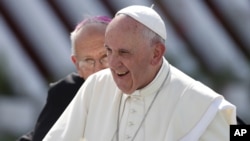House Speaker John Boehner has been trying for 20 years to get a pope to come talk to Congress, and now it's finally happening.
To House Minority Leader Nancy Pelosi, it's "thrilling beyond words.''
This week's historic address by Pope Francis to a joint meeting of Congress has lawmakers of all political affiliations and religious backgrounds buzzing.
For the many Catholic lawmakers on Capitol Hill, including Republican Boehner and Democrat Pelosi, the occasion carries special significance, even as they brace for the unconventional pontiff to make both parties squirm with his focus on hot-button political and social issues.
Ahead of Thursday's speech, many lawmakers said they hope that the leader of the globe's 1.2 billion Catholics will provoke members of Congress to pause, reflect, and refrain, if only temporarily, from the partisan struggles and political bickering that normally dominate the House chamber where he will speak.
At the same time, lawmakers have begun invoking the pontiff to make points on one issue or another, with Democrats in particular hopeful that he will provide backing against the Republican majority on issues such as income inequality, immigration and climate change.
"There's always the hope of epiphany,'' said Sen. Sheldon Whitehouse, D-R.I., a leading voice in Congress pushing for action to combat global warming.
Some in the GOP are suspicious of the pope's activist stance on such issues.
One House Republican, Paul Gosar of Arizona, announced plans to boycott Francis' speech because of reports that the pontiff might focus on climate change.
Gosar argued that "if the pope wants to devote his life to fighting climate change, then he can do so in his personal time'' and said the pontiff should use his foray into "hell's den'' — Congress — to focus on religious tolerance and the sanctity of life.
But Republicans can take comfort in other positions Francis advocates, including opposition to abortion, and may hear him speak about that amid pressure from conservatives to use must-pass spending legislation in coming days to remove funding for Planned Parenthood. Senate Republicans scheduled a bill to block most late-term abortions for Tuesday, just ahead of Francis' arrival, provoking complaints from Democrats.
"I just hope that what we hear are things that are less close to specific policies before us than the higher aspirational goals for the world,'' said Sen. Thom Tillis, R-N.C. "It's an opportunity of a lifetime for me. Billions of Catholics never get to be in the same city with him, versus being in the same room, so I'm just excited to be there and to hear what he has to say.''
With Boehner and Vice President Joe Biden, another Catholic, seated behind him, Francis will become the rare religious leader to address a joint meeting of Congress. According to the House historian, the first was Britain's Queen Elizabeth II in 1991. The British monarch is also technically head of the Anglican Church. Officially Francis will be speaking in his capacity as head of state of Vatican City.
Tens of thousands of people are expected to throng the Capitol, where Francis' address will be broadcast on Jumbotrons on the West Front to those who were able to get tickets.
After he speaks to Congress he's expected to step out to the West Front to greet the crowds. His entire visit to the Capitol is scheduled to last just 90 minutes, yet the planning and preparations have been intense: a combination of "a State of the Union address and an inauguration,'' Pelosi told reporters.
In advance, House and Senate leaders sent a letter to lawmakers emphasizing decorum, "out of respect for the pope's schedule and the expectations of a timely address.''
The letter asks lawmakers to refrain from handshakes and conversations along the center aisle as dignitaries and the pope arrive, noting that the speech "will be seen around the world and by many of our constituents.''
Similar appeals are sent to lawmakers ahead of State of the Union addresses and other events. This time, leaders hope to avoid the partisan outbursts and competing outbreaks of applause that sometimes characterize such occasions.
"My hope is that we will be a dignified, respectful audience for the pope's message. This is not a State of the Union speech where members act in very partisan ways as if it's a high school pep rally at times,'' said Sen. Susan Collins, R-Maine, a Catholic who is bringing her 88-year-old mother to the address. "Fortunately this pope is very approachable and down to earth and humble so I don't think he will easily take offense,'' Collins added.
The pope will address a Congress where Catholics are overrepresented compared to the general population, according to the Pew Research Center. Catholics account for 30 percent of members of Congress, compared with 22 percent of American adults generally.
"I think there's a lot of interest in what the pope is saying, his outreach to the poor, the fact he thinks people ought to be more religious,'' Boehner said recently in remarks released by his office. "He's got some other positions that are a bit more controversial. But it's the pope.''




